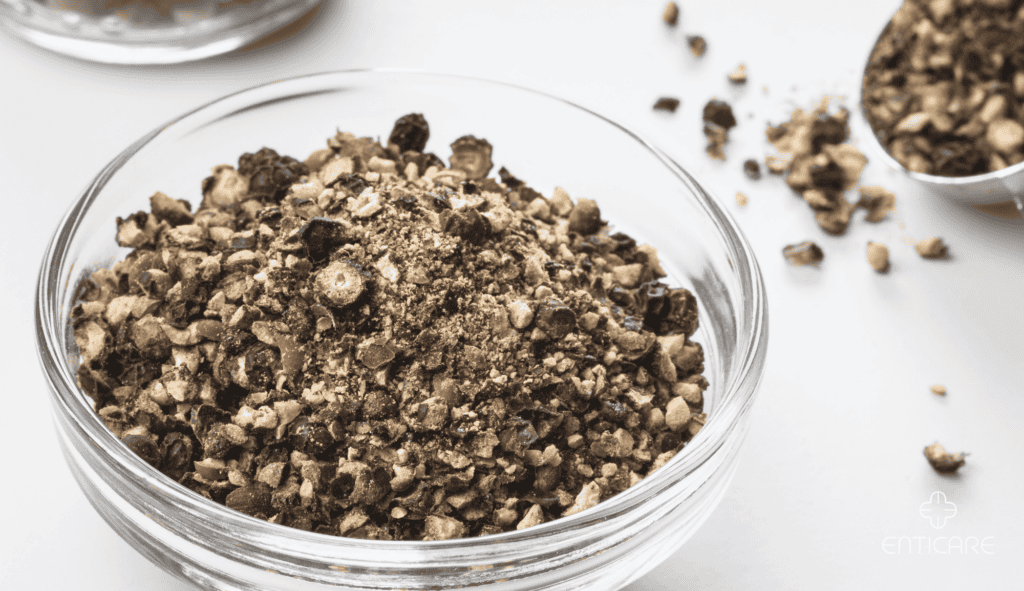Black pepper is a common spice found in many kitchens worldwide, adding flavor to everything from savory dishes to snacks. However, for some people, black pepper triggers adverse reactions that can range from mild to severe due to the release of histamines by the immune system. If you suspect that black pepper may be causing your allergic symptoms, it’s important to understand the causes, recognize the signs, and manage your allergy effectively.
In this blog, we’ll break down the key facts about black pepper allergy, its symptoms, how it is diagnosed, which foods to avoid, and the available treatments. We aim to provide valuable insights and guidance to help you manage this often-overlooked allergy and live a healthier, more comfortable life.

What Is a Black Pepper Allergy?
Black pepper allergy, although rare, is a serious condition that can have significant health impacts if left unmanaged. Identifying if someone is allergic to black pepper can be challenging due to its widespread use in various foods and the similarity of symptoms to other food allergies, which also involve an immune response. Unlike food intolerances, which are limited to digestive issues, a true black pepper allergy involves the immune system and can cause severe allergic reactions.
Understanding the Allergen
What causes the allergy? A true black pepper allergy is a type of food allergy that involves the immune system. Black pepper contains certain proteins that can cause an allergic reaction in some people. These proteins trigger the immune system to overreact, leading to the release of histamines and other chemicals that cause symptoms.
Is it common? Compared to other food allergies, black pepper allergy is less common but still important to recognize. The symptoms may not always be immediately apparent, which can make diagnosis tricky. Keeping a food diary and performing elimination diets can help identify potential allergens.
Cross-reactivity with other spices: People with black pepper allergies might also be sensitive to other spices, such as white pepper or chili pepper, due to the similar compounds they contain. This condition is known as cross-reactivity.
Black Pepper Allergy Symptoms
Recognizing allergy symptoms of a black pepper allergy is crucial, as they are caused by the release of histamines in the body. The symptoms can vary widely from person to person, and they may depend on how much pepper has been consumed or inhaled.
Common Symptoms
- Respiratory symptoms: Breathing issues such as sneezing, coughing, runny nose, and shortness of breath often accompany black pepper allergy due to the immune response. Some people may also experience wheezing, similar to asthma symptoms, especially after inhaling black pepper while cooking or eating.
- Skin reactions: Black pepper can cause contact dermatitis or rashes for some individuals. Itchy, red, and inflamed skin may occur after touching or ingesting black pepper. Hives (raised, itchy welts) may also appear.
- Gastrointestinal issues: Such as stomach pain, abdominal pain, diarrhea, nausea, and vomiting, can also signal a black pepper allergy. These symptoms often occur soon after eating food containing black pepper.
Severe Reactions
- Anaphylaxis: In rare cases, severe symptoms of black pepper allergy can lead to anaphylaxis, a life-threatening allergic reaction that requires immediate medical attention. Symptoms include difficulty breathing, a sudden drop in blood pressure, and loss of consciousness. If you suspect anaphylaxis, call 911 or seek emergency medical care right away.
- Swelling of the face and throat: Swelling, particularly in the mouth, throat, and face, can occur as part of a more serious allergic reaction. Swollen airways can make breathing difficult and require urgent medical intervention.

Diagnosis of Black Pepper Allergy
Accurate diagnosis of a black pepper allergy is important for avoiding future allergic reactions and understanding the immune response involved. If you suspect that black pepper may be causing your symptoms, seek a formal diagnosis from a healthcare professional. A black pepper allergy test is crucial for accurate diagnosis and understanding of the specific allergens involved.
Black Pepper Allergy Test Methods
- Skin prick test: A common way to diagnose food allergies is through a skin prick test, which can identify the release of histamines in response to black pepper. In this test, a small amount of the suspected allergen (in this case, black pepper) is introduced to the skin, usually on the forearm. If you are allergic, a raised bump or reaction will appear at the test site, helping to identify black pepper allergy symptoms.
- Blood test: Blood tests can detect the presence of specific antibodies (Immunoglobulin E or IgE) that react to black pepper. Your doctor may recommend this if you cannot undergo a skin test or if the skin test results are inconclusive.
- Oral food challenge: For more accurate results, your doctor may conduct an oral food challenge, where you consume a small amount of black pepper under medical supervision. This test is done cautiously due to the risk of a severe allergic reaction.
Foods to Avoid with a Black Pepper Allergy
Knowing which foods to avoid is critical for managing a black pepper allergy. Black pepper is found in many dishes, so being cautious about ingredient lists and restaurant menus can help prevent accidental exposure. Additionally, individuals with a black pepper allergy might also need to avoid bell peppers due to potential cross-reactivity.
Common Foods Containing Black Pepper
- Prepared and packaged foods: Many processed foods, such as soups, sauces, and pre-packaged meals, contain black pepper for flavoring. Always check ingredient labels carefully to avoid unwanted exposure. Individuals allergic to black pepper might also react to green pepper.
- Seasoned meats and snacks: Black pepper is frequently used in seasoning blends for meats, potato chips, nuts, and snacks. Ask about the seasoning when dining out or ordering takeout to ensure black pepper isn’t used.
- Condiments and dressings: Condiments like salad dressings, marinades, and sauces often contain black pepper. Homemade versions without pepper or pre-made alternatives may be safer options.
Hidden Sources
- Restaurant meals
- When dining out, ask your server about the ingredients used in your dish, especially for items like steak, grilled vegetables, or soups. Cross-contamination in kitchens can also pose a risk.
- Spice blends
- Black pepper is a common ingredient in spice mixes, including curry powder, Cajun seasoning, and garam masala. Choose single-ingredient spices and create your own spice blends to avoid black pepper.

Treatment and Management of Black Pepper Allergy
The most effective way to manage a black pepper allergy is to avoid exposure, as it involves the immune system. However, treatments are available to manage symptoms when accidental exposure occurs.
Emergency Treatment for Severe Reactions
- Epinephrine (EpiPen)
- If you have a history of severe allergic reactions, your doctor may prescribe an epinephrine auto-injector, such as an EpiPen, to manage the immune response. Epinephrine can stop the progression of anaphylaxis and buy you time until emergency medical care arrives.
- Antihistamines
- For mild reactions, over-the-counter antihistamines like Benadryl can help reduce itching, hives, and swelling. Always keep antihistamines on hand if you have known food allergies.
Long-Term Management
- Consult an allergist
- Work with an allergist to develop an allergy management plan that fits your lifestyle. Regular check-ins with your doctor can ensure that your symptoms remain under control and help prevent serious reactions.
- Read food labels
- Become diligent about reading food labels and asking about ingredients when eating out. This step is essential for avoiding hidden black pepper in processed foods, spice blends, and restaurant dishes.
- Avoid cross-contamination
- Be mindful of cross-contamination, especially in shared cooking spaces. Even a small amount of black pepper can trigger an allergic reaction.
Conclusion: Take Control of Your Allergy
Living with a black pepper allergy can be challenging, but you can take control of your health by understanding the facts, symptoms, and treatment options available, as it involves the immune system. If you suspect you have a black pepper allergy, schedule an appointment with one of our experienced allergy specialists at Enticare. We’ll help you identify your triggers and develop a personalized plan to manage your allergy effectively.
Take the first step toward managing your black pepper allergy today! Don’t wait—get expert care and start feeling better.

